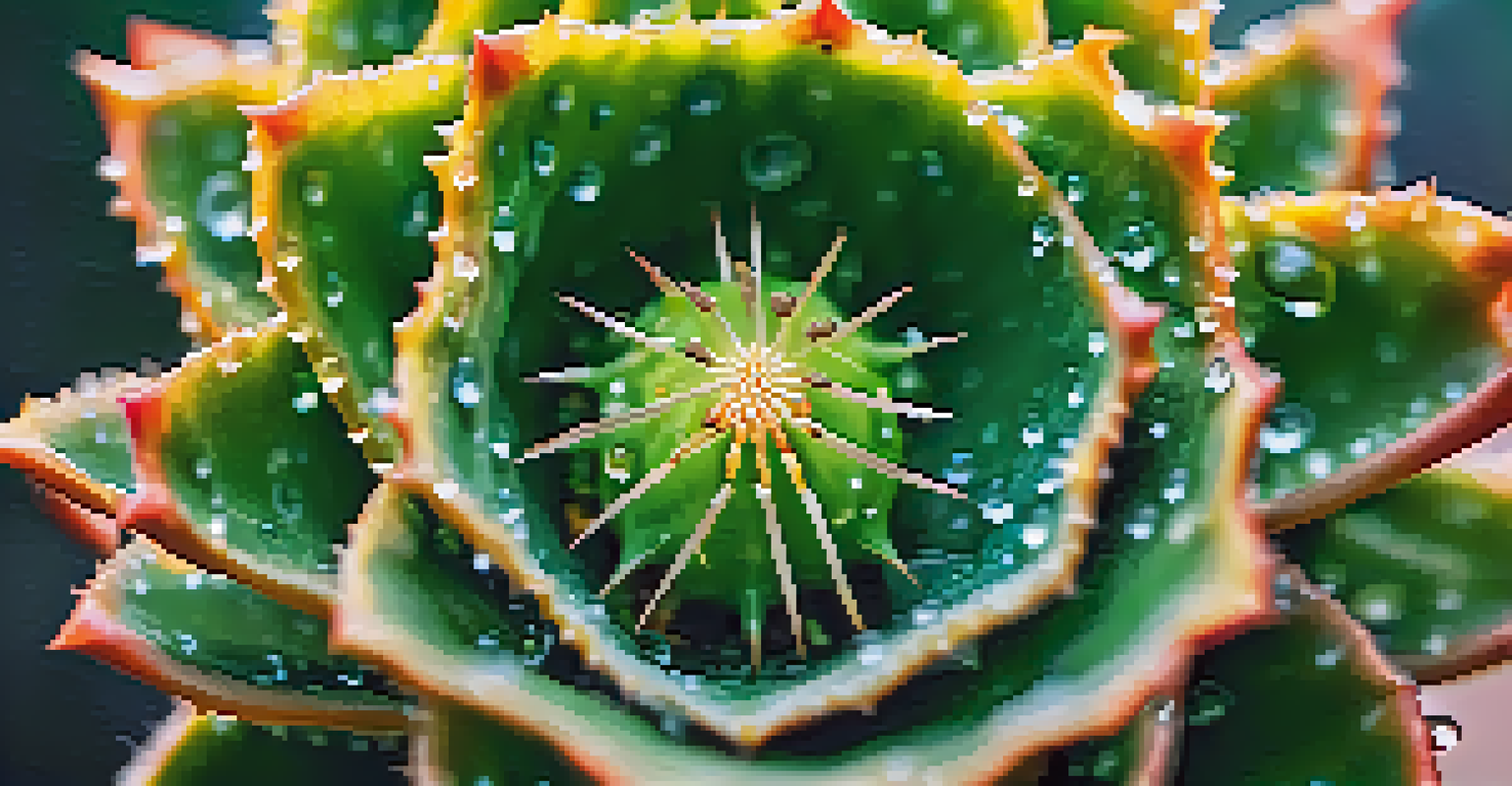Peyote and Mental Health: A Traditional Approach to Healing

Understanding Peyote: A Sacred Cactus
Peyote, a small cactus native to Mexico and the southwestern United States, has been used for thousands of years in spiritual and healing practices. Its psychoactive compound, mescaline, is known for inducing altered states of consciousness. For many Indigenous cultures, peyote is not just a plant; it’s a sacred part of their identity and traditions.
The use of peyote in traditional ceremonies offers participants deep introspection and a connection to their spiritual beliefs.
The use of peyote in traditional ceremonies offers participants deep introspection and a connection to their spiritual beliefs. This sacred approach emphasizes respect for the plant and the experiences it provides. By understanding peyote's cultural significance, we can appreciate its role in healing beyond mere recreational use.
In recent years, there’s been a growing interest in how such traditional practices can inform modern mental health treatments. This curiosity leads us to explore the intersections of ancient wisdom and contemporary therapeutic approaches, prompting an exciting dialogue about mental health and healing.
The Role of Peyote in Traditional Healing Practices
In Indigenous cultures, peyote is often used in ceremonial settings led by a shaman or healer who guides participants through their experiences. These ceremonies are deeply communal, fostering connections not just with the self but also with others and the universe. Participants often report profound insights and emotional release during these ceremonies, which can be transformative.

The healing process is not solely about the peyote itself; it’s about the context in which it is consumed. The rituals accompanying its use create a safe space for individuals to confront and process their emotions. This holistic approach to mental health emphasizes the importance of community, ritual, and spirituality in healing.
Peyote's Cultural Significance
Peyote is not just a plant but a sacred element of identity and tradition for many Indigenous cultures, emphasizing deep respect and ceremonial use.
By integrating peyote into these traditional practices, it becomes a tool for navigating mental health challenges. This contrasts with conventional therapies, which may focus solely on the individual’s symptoms without acknowledging the broader emotional and spiritual landscape.
Psychoactive Properties: How Peyote Affects the Mind
Psychoactive substances like peyote can alter perception, mood, and consciousness, leading to experiences often described as mystical or enlightening. Mescaline works by interacting with serotonin receptors in the brain, which can facilitate deep emotional exploration and introspection. As a result, many participants find clarity regarding their thoughts and feelings.
The journey to healing is deeply personal and can take many forms.
These experiences can help individuals confront unresolved trauma, anxiety, or depression. For some, the insights gained during a peyote ceremony can illuminate paths toward healing that conventional methods may not uncover. This can be especially valuable for those who feel stuck in their mental health struggles.
However, it’s essential to approach these experiences with caution and respect. While peyote has the potential to provide profound insights, it’s not a panacea; individuals should consider their mental health history and consult with knowledgeable practitioners before exploring this path.
Clinical Research: Supporting Traditional Wisdom
Recent studies have begun to explore the therapeutic benefits of psychedelics, including peyote. While research is still in its infancy, early findings suggest that peyote may assist in treating mental health conditions such as PTSD, depression, and anxiety. These studies aim to bridge the gap between traditional healing practices and modern scientific understanding.
The resurgence of interest in psychedelics for mental health treatment is prompting a reevaluation of their potential role in therapy. Researchers are investigating how these substances can be integrated into treatment protocols, potentially offering new avenues for individuals who haven’t found relief through traditional methods.
Therapeutic Potential of Peyote
Emerging research suggests that peyote may provide valuable therapeutic benefits for mental health conditions like PTSD, depression, and anxiety.
This clinical exploration aligns with Indigenous perspectives, affirming the healing power of plants like peyote. As the scientific community becomes more open to understanding these traditional practices, we might see a more holistic approach to mental health emerge in mainstream therapy.
Personal Stories: Transformative Experiences with Peyote
Many individuals who have participated in peyote ceremonies share transformative stories of healing and self-discovery. One common theme is the ability to confront personal demons and gain lasting insights into one’s life. These narratives often highlight a sense of renewed purpose and connection to both oneself and the world.
For example, a participant might describe how a peyote ceremony helped them process grief or trauma, leading to a shift in their mental health. Such stories underscore the potential for peyote to facilitate emotional breakthroughs that traditional therapies may not achieve.
These personal accounts not only validate the experiences of those within Indigenous communities but also inspire others to consider alternative approaches to mental health. They remind us that the journey to healing is deeply personal and can take many forms.
Safety and Ethical Considerations in Peyote Use
While peyote has potential benefits, it’s crucial to approach its use with a strong sense of responsibility and ethics. The cultural significance of peyote to Indigenous peoples cannot be overstated; therefore, it’s essential to respect the traditions surrounding its use. Engaging with peyote outside of its traditional context can lead to cultural appropriation, which can be harmful.
Individuals interested in exploring peyote should seek guidance from experienced practitioners who respect its cultural roots. It's also important to consider legal implications, as peyote use is restricted in many areas. Understanding the legal and ethical landscape is vital for anyone considering this path.
Ethics and Safety in Peyote Use
Responsible use of peyote requires understanding its cultural roots, seeking guidance from knowledgeable practitioners, and considering legal and safety implications.
Moreover, potential side effects should not be overlooked. While many report positive experiences, peyote can also lead to challenging emotional responses or exacerbate certain mental health conditions. This reinforces the need for careful consideration and informed decision-making.
The Future of Peyote in Mental Health Treatment
As interest in alternative mental health treatments grows, peyote’s role is likely to evolve. Increasing recognition of the importance of holistic and culturally sensitive approaches to mental health opens doors for traditional practices to be integrated into modern therapy. This shift could lead to more comprehensive mental health care options.
The ongoing dialogue between Indigenous wisdom and contemporary science may yield innovative therapeutic frameworks that utilize peyote responsibly. Such frameworks can honor its cultural significance while providing meaningful support for those in need of mental health care.

Ultimately, the future of peyote in mental health treatment hinges on respect, understanding, and collaboration. By honoring traditional practices and integrating them within a modern context, we can pave the way for healing that is both effective and culturally sensitive.